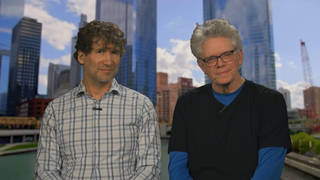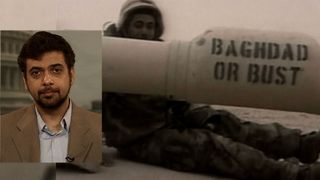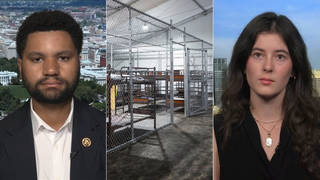
President Bush firmly rejected demands for a withdrawal of US troops from Iraq and tried to refocus America’s attention on the threat from Islamic extremism. We speak with investigative reporter Robert Dreyfuss, author of “Devil’s Game: How the United States Helped Unleash Fundamentalist Islam.” [includes rush transcript]
President Bush firmly rejected demands for a withdrawal of US troops from Iraq and tried to refocus America’s attention on the threat from Islamic extremism.
In what the White House billed as a major speech, Bush addressed the National Endowment for Democracy in Washington on Thursday. He said the United States and its allies had disrupted 10 serious al Qaeda plots since 9/11, compared the war on terrorism to the struggle against communism and outlined what he said was a broad strategy by Muslim terrorists to dominate much of the world.
- President Bush, October 6, 2005.
President Bush’s speech was part of a White House effort to rebuild waning support for the Iraq war amid an upsurge of violence ahead of an October 15 vote on an Iraqi constitution. In his speech, Bush sought to put the US occupation of Iraq in a global context and praised what he called steps towards democracy.
- President Bush, October 6, 2005.
President Bush speaking Thursday. The Shiite-led Iraqi government recently reversed last-minute changes that made to the rules for the October 15th vote on the constitution. On Sunday the parliament had made changes that would have made it nearly impossible for the Sunni minority to defeat the charter at the polls.
- Robert Dreyfuss, investigative reporter. He is a contributing editor at The Nation, a contributing writer at Mother Jones and a senior correspondent for The American Prospect. His book, “Devil’s Game: How the United States Helped Unleash Fundamentalist Islam” has just been published.
Transcript
JUAN GONZALEZ: In what the White House billed as a major speech, Bush addressed the National Endowment for Democracy in Washington on Thursday. He said the United States and its allies had disrupted ten serious al Qaeda plots since 9/11, compared the war on terrorism to the struggle against communism and outlined what he said was a broad strategy by Muslim terrorists to dominate much of the world. This is an excerpt of what he had to say.
PRESIDENT GEORGE W. BUSH: Many militants are part of global borders, terrorist organizations like al Qaeda, which spreads propaganda and provides financing and technical assistance to local extremists and conducts dramatic and brutal operations like September 11. Other militants are found in regional groups often associated with al Qaeda, paramilitary insurgencies and separatist movements in places like Somalia and the Philippines and Pakistan and Chechnya and Kashmir and Algeria.
JUAN GONZALEZ: President Bush, speaking on Thursday in Washington. We’re joined now by investigative reporter and author, Robert Dreyfuss. He’s a contributing editor at The Nation, a contributing writer at Mother Jones, and a senior correspondent for The American Prospect. His new book is titled Devil’s Game: How the United States Helped Unleash Fundamentalist Islam. Welcome to Democracy Now!, Bob.
ROBERT DREYFUSS: Thanks very much. Glad to be here.
JUAN GONZALEZ: Well, you no doubt heard the President’s speech yesterday, and he talked for the first time about Islamo-fascism and the threat of domination from extremists, fundamentalist extremists. Your reaction to some of his comments?
ROBERT DREYFUSS: Well, you know, in the political context of Bush’s collapsing poll numbers and general deterioration in public opinion, I think it was a desperatist speech. I think he was reaching out to people to try to get across the idea that we’re winning somehow the war against terrorism. Instead, what he did is he bought into this idea that was put forward by neoconservatives over the past, gosh, four years now, that this is a global struggle akin to the Cold War, that this is an unending struggle against tyranny that’s going to preoccupy the United States for years or decades to come. He’s inflating tremendously the scope, basically, of the war on terrorism itself, and he is ignoring utterly the fact that the war in Iraq has done more than anything else to intensify the bitterness and resentment, even hatred of the United States all across the Muslim world, which is the prime recruiting tool for Islamic radicals.
So, I think the idea that this is even a war that can be won in military terms has been rejected now by the military. A few weeks ago, when the generals tried to say — and Rumsfeld even got into the act, saying that this is a struggle that involves primarily intelligence and diplomacy and cooperation of other countries. The President jumped into that debate to say that this was, in fact, going to be a continuing military struggle. I think he is finding it increasingly impossible to sell the idea that the war in Iraq is having any success whatsoever, and so he is making this again desperate effort to try to recast or to cast — again to cast the war in Iraq as part of some struggle against terrorism. But as other people have observed, invading Iraq after 9/11 was the equivalent of Franklin Roosevelt invading Mexico after Pearl Harbor. There’s no relationship between the two, and by going into Iraq and by continuing to fight a hopeless battle there, we’re making the problem of terrorism far worse and certainly not better.
JUAN GONZALEZ: And, of course, he never mentioned at all, and we wouldn’t expect him to, the role of the United States, as you document in your book, Devil’s Game, in terms of feeding the development of fundamentalist movements throughout the Middle East. Could you talk about that a little bit?
ROBERT DREYFUSS: Well, you know, for 50 years during the Cold War, a lot of people in the United States in policy circles and in intelligence circles saw political Islam — I call it the Islamic right, sort of analogous to the Christian right — as allies in the struggle against the Soviet Union and also against — in the struggle against nationalisms, that is, Arab nationalism and nationalism in India and Iran and elsewhere. So, in the sense that this was a Cold War battle, it carried over through Afghanistan into the present time.
If I were worried about Islamic extremism, I would worry first and foremost about the current government of Iraq. It’s the Shiite fundamentalist extremists, as represented by the Supreme Council for the Islamic Revolution in Iraq and by Al Dawa, the two main Shiite parties in Iraq, which now again have the full support of the U.S. government to the tune of billions of dollars and 150,000 troops, that are promoting an extreme right wing, I would say, fascist Islamic ideology.
So, if the President is concerned about Islamic fascism, he ought to do something about the Hakeem family in Iraq and others who are busily creating a theocratic state there, running death squads, attacking moderate Sunnis, bombing liquor stores and barber shops and movie theaters, and forcing women to adopt their distorted, weird version of what Islamic law requires women to look like, and, of course, on top of everything else, building ties to Iran’s intelligence service and revolutionary guard. So, here we are, on the one hand, the President is talking about an “Islamic threat,” quote, unquote, to the United States, and on the other hand we’re propping up the world’s biggest extremist Islamic force in southern and central Iraq, and which is basically in control of the government in Baghdad.
JUAN GONZALEZ: We’re speaking with investigative reporter and author, Robert Dreyfuss. Well, President Bush’s speech was part of a White House effort to rebuild waning support for the Iraq war, amid an upsurge of violence ahead of an October 15 vote on an Iraqi constitution. In his speech, Bush sought to put the U.S. occupation of Iraq in a global context and praise what he called steps towards democracy. President Bush speaking Thursday.
PRESIDENT GEORGE W. BUSH: Some observers question the durability of democracy in Iraq. They underestimate the power and appeal of freedom. We have already suggested that Iraq’s democracy must be on shaky ground because Iraqis are arguing with each other. But that’s the essence of democracy: making your case, debating with those who you disagree, building consensus by persuasion, and answering to the will of the people. We have heard it said that the Shia, Sunnis and Kurds of Iraq are too divided to form a lasting democracy. In fact, democratic federalism is the best hope for unifying a diverse population, because a federal constitutional system respects the rights and religious traditions of all citizens, while giving all minorities, including the Sunnis, a stake and a voice in the future of their country. It is true that the seeds of freedom have only recently been planted in Iraq. But democracy, when it grows, is not a fragile flower. It is a healthy, sturdy tree.
JUAN GONZALEZ: That was the President speaking on Thursday. The Shiite-led Iraqi government recently reversed last minute changes that were made to the rules for a October 15th votes on the constitution. On Sunday, the parliament had made changes that would have made it nearly impossible for the Sunni minority to defeat the charter at the polls. Robert Dreyfuss, you have written extensively about the political process in Iraq.
ROBERT DREYFUSS: Yeah. I think that this constitution is pretty much a catastrophe. Most of the people who know anything about Iraq in Washington say that it’s going to make the situation much, much worse, and not better. In fact, what’s likely to happen on October 15 is that the Sunnis and the Sunni-led resistance all across the country will mobilize to defeat the constitution, and they’ll fail. So, in other words, they will come out of this vote angry and bitter over the fact that this constitution, which was put together by the Kurdish and Shiite majority, is being rammed down their throats. There is, unfortunately, no effort by the United States, at least nothing approaching the scale of what’s needed, to incorporate the Sunnis into this democracy.
It’s not that they’re arguing with each other, as the President says. This is a civil war situation and one that could get astronomically worse next year. In other words, we could go from a situation where about a thousand Iraqis a month are dying in this civil conflict to one that would be ten or even a hundred times worse. It’s not out of the question that several hundred thousand or a million Iraqis could die over the next two years if this falls into open civil war.
So, the President’s happy talk about Iraq and the constitution and the coming elections is completely wrong and misses the point that Iraq is teetering at the brink of absolute disaster. And the only way out of it is a 180-degree change in this stay-the-course philosophy, but so far, at least, there’s no sense among anyone in Washington that the Bush administration is prepared to make that turnaround.
JUAN GONZALEZ: We are talking with Robert Dreyfuss, an investigative reporter and a contributing editor at The Nation. We’ve got to take a break, but when we return, we’ll look at the spy scandal in Washington involving the American Israel Public Affairs Committee.













Media Options